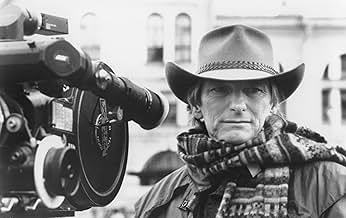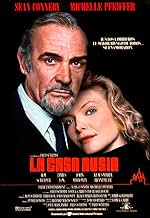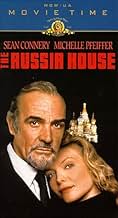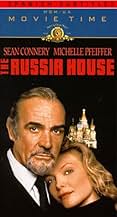CALIFICACIÓN DE IMDb
6.1/10
19 k
TU CALIFICACIÓN
Un editor británico expatriado acaba trabajando inesperadamente para la inteligencia británica para investigar a personas en Rusia.Un editor británico expatriado acaba trabajando inesperadamente para la inteligencia británica para investigar a personas en Rusia.Un editor británico expatriado acaba trabajando inesperadamente para la inteligencia británica para investigar a personas en Rusia.
- Dirección
- Guionistas
- Elenco
- Premios
- 1 premio ganado y 5 nominaciones en total
Ian McNeice
- Merrydew
- (as Ian McNiece)
Peter Marinker
- U.S. Scientist
- (as Peter Mariner)
- Dirección
- Guionistas
- Todo el elenco y el equipo
- Producción, taquilla y más en IMDbPro
Opiniones destacadas
In a nutshell: a Russian missile scientist, nicknamed Danté offers an obscure Brit publisher, Barley Blair, data that shows Russian missiles are junk.
The '8' is my old rating-I might revise this to 9 or 10 after a fresh viewing. Here's why: 1. I believe le Carré must have had Connery in mind for the lead character, Barley Blair. Truth is: Connery was born to play this role-no one else comes to mind. Barley is a drinker, publisher, philosopher at large. A bit of an anarchist, but firmly non-political. A jazz clarinetist who likes to gab about dreams of world peace-but he really does NOT want to get involved in the process. Connery is perfect.
2. Filmed partially in Russia, the scenery of Moscow & Leningrad is spectacular! This was an early (1990) production with Russian cooperation.
3. Tremendous supporting cast: Roy Scheider (from'Jaws') as Russel Sheridan, the chief agent for US Intelligence, has to play a character of many qualities, above all, an optimist for truly ending the Cold War. When things don't go as expected, he tells the team, 'Put the stools on the bar-TIL next time'. Honorable mention: John Mahoney as 'Brady', the super spy who has the ear of all the American higher-ups, including the President (in the book, Brady is given godlike status-note what he says about the 'deal' being offered by Danté.). And many others! Nice to see a young Martin Clunes as an orderly-long before his Doc Martin days.
4. Not an action film, no sex scenes but some harsh language-but, basically a dramatic study of the Cold War's conclusion. Carré was correct in pondering that even if the USSR missile system lagged way behind the Allied side, would the USA put thousands out of work by shutting down their production?
5. Fabulous irony. Danté tells Blair that 'the men in grey suits came to get his father, & they will come to get you, too!' Barley, like us, is reluctant to accept the notion that the 'good guys' are just as ruthless, but consider how strongly the Americans suspect Blair of complicity, when all indicators show that he is just not interested in money nor political matters.
The '8' is my old rating-I might revise this to 9 or 10 after a fresh viewing. Here's why: 1. I believe le Carré must have had Connery in mind for the lead character, Barley Blair. Truth is: Connery was born to play this role-no one else comes to mind. Barley is a drinker, publisher, philosopher at large. A bit of an anarchist, but firmly non-political. A jazz clarinetist who likes to gab about dreams of world peace-but he really does NOT want to get involved in the process. Connery is perfect.
2. Filmed partially in Russia, the scenery of Moscow & Leningrad is spectacular! This was an early (1990) production with Russian cooperation.
3. Tremendous supporting cast: Roy Scheider (from'Jaws') as Russel Sheridan, the chief agent for US Intelligence, has to play a character of many qualities, above all, an optimist for truly ending the Cold War. When things don't go as expected, he tells the team, 'Put the stools on the bar-TIL next time'. Honorable mention: John Mahoney as 'Brady', the super spy who has the ear of all the American higher-ups, including the President (in the book, Brady is given godlike status-note what he says about the 'deal' being offered by Danté.). And many others! Nice to see a young Martin Clunes as an orderly-long before his Doc Martin days.
4. Not an action film, no sex scenes but some harsh language-but, basically a dramatic study of the Cold War's conclusion. Carré was correct in pondering that even if the USSR missile system lagged way behind the Allied side, would the USA put thousands out of work by shutting down their production?
5. Fabulous irony. Danté tells Blair that 'the men in grey suits came to get his father, & they will come to get you, too!' Barley, like us, is reluctant to accept the notion that the 'good guys' are just as ruthless, but consider how strongly the Americans suspect Blair of complicity, when all indicators show that he is just not interested in money nor political matters.
An American spy drama and romance; A story about a British publisher persuaded to go undercover to investigate the motive of an author who is exposing Soviet secrets. Adapted from John le Carré's novel, a compelling glossy drama with a theme about the resurrection of buried hopes by betrayal. It is notable for capturing a plausibility of the realities of the time-Perestroika and post-glasnost Russia. The direction is subtle for a story that is reserved, though it occasionally gets sluggish in the plot with its standard-fare espionage. What carries the film, though, is the character-driven intrigue, witty dialogue, and strong emotional core. Connery's performance is complex, as the flawed publisher is attracted to Pfeiffer's charming go-between, a performance that is also persuasive and credible. There is fine support from Klaus Maria Brandauer as the mysterious scientist and Roy Scheider and James Fox as the bickering spy chiefs under pressure. Aside from the escapism and beautiful locales, easily the most exquisite filmic element is the critically acclaimed musical score by Jerry Goldsmith, which sweeps the audience along through the mood of places, national characteristics, and the main character's relationship.
The Russia House
I must confess, this is easily my favourite film. I have watched only a handful of films more than once. This film I have watched at least twenty times but by the time you read this it will be many more since I watch it at least every 6 weeks or so. I sit down with a bottle of genuine Russian vodka, a small tin of red caviar and some hard white bread, I turn up the dolby 5.1 and soak up the experience. Why is this film so good? Well for a start it is from a book by John LeCarre who must be our best living author. Who else researches a book so thoroughly? Every location has been checked, every character totally believable, with an intelligent plot.
Secondly the screenplay by Tom Stoppard is faultless. Having read the book first, I could not believe how faithfully Stoppard made his screenplay- chunks of LeCarre dialogue are faithfully copied. Then there is the acting. There are memorable performances from Sean Connery (Barley) and Michel Pfeiffer(Katya), the beautiful Russian heroine. Klaus Maria Brandauer wins my "best supporting actor" award as the totally believable Russian scientist. There are so many memorable lines of dialogue in this film. Brandauers line "If I will be a hero, will you act like a merely decent human being" always brings a lump to my throat. Barley's tongue in cheek replies to his CIA interrogators are wonderful. What gives this film such a feeling of authenticity are the locations which are all genuine Moscow and St Petersburg. Already Moscow has changed a lot since this film was made. The lovely old National hotel shown in the film has been demolished and replaced with a modern nonentity, so this film is rapidly becoming a piece of history. The buildings are changing but the same faceless KGB operators are still there. How can one flawed man fight the power of the spymasters. Barley shows how to do it. What a hero! Does it have any faults?If only Ken Russell had stuck to directing and left acting to actors.
I must confess, this is easily my favourite film. I have watched only a handful of films more than once. This film I have watched at least twenty times but by the time you read this it will be many more since I watch it at least every 6 weeks or so. I sit down with a bottle of genuine Russian vodka, a small tin of red caviar and some hard white bread, I turn up the dolby 5.1 and soak up the experience. Why is this film so good? Well for a start it is from a book by John LeCarre who must be our best living author. Who else researches a book so thoroughly? Every location has been checked, every character totally believable, with an intelligent plot.
Secondly the screenplay by Tom Stoppard is faultless. Having read the book first, I could not believe how faithfully Stoppard made his screenplay- chunks of LeCarre dialogue are faithfully copied. Then there is the acting. There are memorable performances from Sean Connery (Barley) and Michel Pfeiffer(Katya), the beautiful Russian heroine. Klaus Maria Brandauer wins my "best supporting actor" award as the totally believable Russian scientist. There are so many memorable lines of dialogue in this film. Brandauers line "If I will be a hero, will you act like a merely decent human being" always brings a lump to my throat. Barley's tongue in cheek replies to his CIA interrogators are wonderful. What gives this film such a feeling of authenticity are the locations which are all genuine Moscow and St Petersburg. Already Moscow has changed a lot since this film was made. The lovely old National hotel shown in the film has been demolished and replaced with a modern nonentity, so this film is rapidly becoming a piece of history. The buildings are changing but the same faceless KGB operators are still there. How can one flawed man fight the power of the spymasters. Barley shows how to do it. What a hero! Does it have any faults?If only Ken Russell had stuck to directing and left acting to actors.
7hbs
Maybe I was just in the right mood, but I found this an effective romance. Michelle Pfieffer was even better than her usual terrific self, and the rest of the excellent cast was, well, excellent. It is pretty slow, but I think that this is essential to the conclusion, which I found quite moving. You have to give this movie a chance to grow on you, but if you are patient it is quite accessible. Not bleak at all, as you'd expect from Le Carre.
Films that require you to pay close attention to every little detail and have a complex plot from the outset can generally be thrust into one of two categories: Stimulating and intellectual, or potential insomnia cures. The Russia House is the former... so keep taking the Nytol. There's much languid talk about politics, international trade, the Cold War, espionage... and for those expecting Sean Connery to slap on a tux and start blowing people away, and going to be sorely disappointed. If on the other hand, you LISTEN to what is being said and are open to the idea of getting small rewards along the way rather than shallow exhibitionism, than this may be right up your street.
Make sure all the windows are closed, the children are in bed, your bladder is empty... because you don't want any meaningless distractions while the story is being told. Not that it moves at a fast pace, but inconsequential moments have repercussions for later on, and simple snatches of dialogue could hold invaluable clues. Russia's never looked better, and the chief photographer captures Moscow in all it's architectural splendour. The much missed Connery (He's retired from acting now, believe it or not) does a sterling job as the amateur spy who doesn't know what side he's on, and sex-on-legs Pfeiffer has a dead-on Russian accent. At least to this untrained ear.
Maybe not for action junkies, but anyone else who appreciates much subtler qualities in film... Please step this way. 7/10
Make sure all the windows are closed, the children are in bed, your bladder is empty... because you don't want any meaningless distractions while the story is being told. Not that it moves at a fast pace, but inconsequential moments have repercussions for later on, and simple snatches of dialogue could hold invaluable clues. Russia's never looked better, and the chief photographer captures Moscow in all it's architectural splendour. The much missed Connery (He's retired from acting now, believe it or not) does a sterling job as the amateur spy who doesn't know what side he's on, and sex-on-legs Pfeiffer has a dead-on Russian accent. At least to this untrained ear.
Maybe not for action junkies, but anyone else who appreciates much subtler qualities in film... Please step this way. 7/10
¿Sabías que…?
- TriviaThe meaning and relevance of the title "The Russia House" is that it refers to the nickname given to the section of the British Secret Service that was assigned to investigating the Soviet Union.
- ErroresDuring Blair's "start the avalanche" speech, Dante is seen at the end of the table. As the camera pans around the table during the speech, Dante disappears from the end of the table, and then reappears.
- Créditos curiososThe credits appear over a series of clips showing location shots from the film, concluding with a repeat of the final scene.
- ConexionesFeatured in A Tribute to Sean Connery (1990)
Selecciones populares
Inicia sesión para calificar y agrega a la lista de videos para obtener recomendaciones personalizadas
Detalles
- Fecha de lanzamiento
- País de origen
- Sitio oficial
- Idiomas
- También se conoce como
- John le Carré's The Russia House
- Locaciones de filmación
- Lisboa, Portugal(on location)
- Productoras
- Ver más créditos de la compañía en IMDbPro
Taquilla
- Presupuesto
- USD 21,800,000 (estimado)
- Total en EE. UU. y Canadá
- USD 22,997,992
- Fin de semana de estreno en EE. UU. y Canadá
- USD 4,435,650
- 25 dic 1990
- Total a nivel mundial
- USD 22,997,992
Contribuir a esta página
Sugiere una edición o agrega el contenido que falta

Principales brechas de datos
By what name was The Russia House (1990) officially released in India in Hindi?
Responda





































